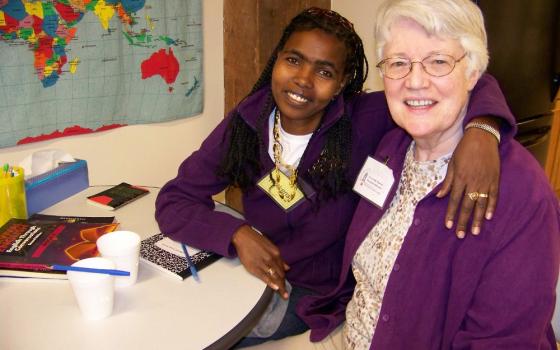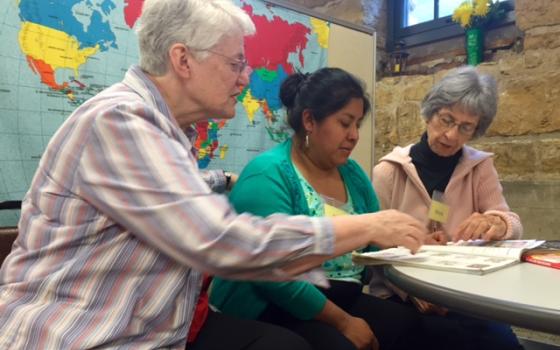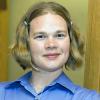Presentation Sr. Corine Murray is the executive director of the Presentation Lantern Center in Dubuque, Iowa. The center offers one-on-one tutoring in English to adult students from around the world. The center has also helped 70 people attain U.S. citizenship. The center opened on Nov. 13 — the Presentation Sisters' foundation day, the day Mother Vincent and her companions arrived in Dubuque in 1874 — in 2002.
Murray, who has served as the center's director for 14 years, recalls learning about slavery and other "affronts to human dignity" as a child and credits her passion for history and Catholic social teaching in helping to form her conscience.
In 2011, Murray received the Ruby Sutton Award and the Matthew 25 Award for her leadership.
GSR: What is the mission of the Presentation Lantern Center?
Murray: Our mission is threefold: hospitality, educational opportunity, and advocacy. Hospitality is absolutely the most important. People for whom English is a second or third language and are struggling need kindness and to be genuinely welcomed. This is a safe place where people find friends and find their voices.
A student from Colombia said, 'Learning the language, being able to talk to your neighbors, it's like growing a new soul.' Wow! We get used to seeing everyday miracles.
What are some of the concrete ways that you extend hospitality at the center?
Students come for two hours. We ring the chimes halfway through. Everybody takes a break at the same time. They meet each other and build community. If something is going on, like Fourth of July fireworks, we talk about that. Or if it's getting close to winter, we talk about wind chill and frostbite because those are brand-new realities. After 15 minutes, students go back to work with their tutors.
Another aspect of hospitality is that classes are free. We help people connect with community resources. A mother may come in and say, 'My son is 2 years old and needs vaccinations.' I can help her make an appointment. Information is power.
Language learning here is individualized. We have people who had fine educations in their countries of origin. Others say, 'I never went to school because my parents didn't have any money.'
What they're doing is so hard. Mary Pipher's book The Middle of Everywhere is about refugees in Lincoln, Nebraska. Pipher says dealing with new language, new food, new weather, new money, new education system, new health care system, new legal system, new everything-under-the-sun system . . . it's like every week is finals week. It takes an incredible amount of energy.
Which countries do the students come from, and what brought them to the U.S.?
They are from 56 different countries: Mexico, the Marshall Islands, China, a variety of countries in Africa and Central America. Families from Ethiopia fleeing violence. Women from India and Pakistan whose husbands are employed here, but they have not had educational opportunities.
We had a student from the Democratic Republic of Congo who lived through atrocities. She was the calmest, most regal human being I've met.
One Bosnian student said, 'Sometimes, my mom wouldn't let me go outside and play.' Now, my mother wouldn't let me go out and play sometimes if I didn't get some chore done or if I was sick. But his mother wouldn't let him go outside if there were too many dead bodies in the street. What does that do a 7-year-old?
There are incredibly brave people walking our streets with quiet dignity, coping with so much. It may take them time to develop the language and trust, but they all have stories.
What are some of the barriers your students face, and how do you help them overcome their barriers?
For some, it's transportation. Public transportation stops at 6 at night, and navigating the bus schedule isn't easy. We have a corner where a parent can bring a child who can play and hear some English. We try to make learning a gentle experience. We set people up for success by starting with what people know and building a bridge.
How do you find that your tutors are transformed through their relationships with their students?
Our tutors get involved in their students' lives. People find friends. One tutor knew her Ethiopian student liked to crochet and took her to a yarn shop. We had a tutor who said to Sudanese students, 'Our kids are never here for Christmastime. Why don't you come to our house for Christmas?'
It's overwhelming to come to a new country and try to find your way. Adults are often home taking care of children and don't hear much English or are working jobs that are dirty, difficult and dangerous.
Pipher talks about the process with the image of a clock. At 10 minutes after the hour, it's: 'We're here! This is wonderful!' Especially if people have been in a refugee camp for many months. By 20 minutes after the hour: 'Oh, this hard.' About 25 minutes to the top of the hour, there's grief: 'I can never go home. No one here knows my story.'
Eventually, people become bilingual and bicultural and embrace the best of what's here and hang on to the best of where they came from. That picture of the clock captures in one hour what might be seven or eight years. That's a long, hard road.
We are a nation of immigrants. We have 11 million here without documentation. We've got to figure something out that works. Putting everyone on a bus and sending them back isn't the answer.
Yes, that certainly doesn't recognize the reality of mixed-status families. How do you respond to the current political debate about immigration policy?
I'm disturbed with the tone of the rhetoric. We don't make the best decisions when we're afraid. We need to bring cool heads to solving problems in ways that meet needs and address security issues. We desperately need leaders who model better.
There are people who are born on third base and think they hit a triple. Don't assume you did all of this by pulling yourself by your own bootstraps. We are standing on the shoulders of parents, grandparents, good teachers, taxpayers who built roads, people who created the GI Bill. There are lots of things that individuals, churches, and government did to get us where we are. We need to be grateful and generous and pay it forward.
How is your work at the Presentation Lantern Center an expression of your community's charism?
The Presentation community has a charism of hospitality. Hospitality is creating a place in your heart for disadvantaged people. The Scriptures say: 'I was a stranger and you welcomed me' and 'Sometimes without knowing it, we welcomed strangers and entertained angels.'
To leave home is a hard experience. Home is a special place. For people who have been ripped away from home and sometimes can never go back — that's a lot to deal with.
How do your 14 years of ministry at the center inform your prayer and impact your image of God?
I look at the world and watch the news with a different pair of eyes. I always thought God was big. Now my God's even bigger. We operate on the dignity of the human person and the liberating reality of education, helping our brothers and sisters. It's about seeing children made in God's image.
How does your prayer inform your ministry of hospitality here?
In Hebrew and Christian Scriptures, hospitality is a real thread. People have a place at the table. We carry the needs of our brothers and sisters in our prayer and our hearts.
Catholic sisters, because of the inspiration of our foundresses, have education in our DNA. We're about education and service. Catholic sisters are on the right side of history.
[Rhonda Miska is a freelance writer in Dubuque, Iowa, and teaches religious studies at Clarke University. She is a candidate with the Dominican Sisters of Sinsinawa.]


